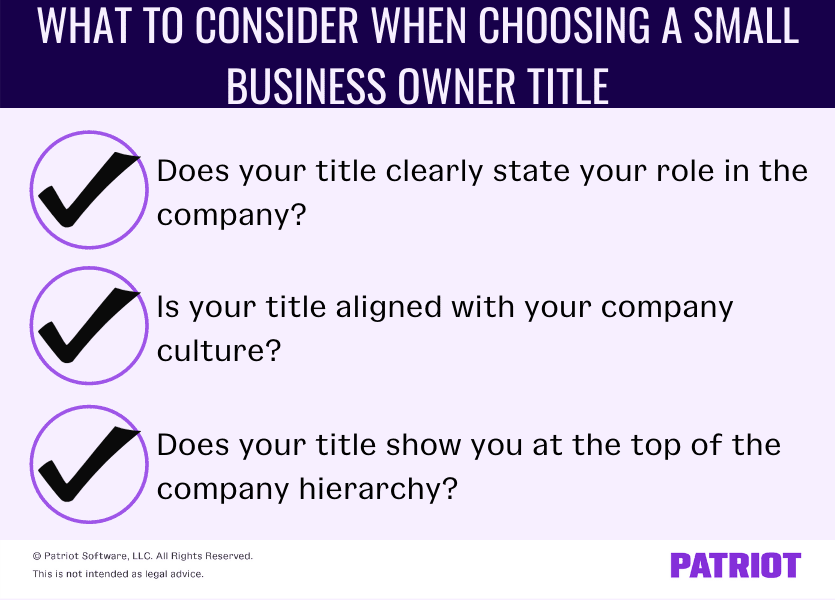Owning your own business may have you feeling like a superstar, but is that the title you want for yourself? Maybe you want to keep it classic and choose CEO. Or, perhaps you want to be a bit more modern and pick Founder. Is your business creative and edgy? You can elect to use a unique title that suits you and your business. Here are some ideas for choosing your small business owner titles.
Small business owner titles
As the owner of your business, your role is vital. You put in the equity and the resources to get your business up and running. So, your title should carry the weight of your responsibilities. The title you choose can vary based on your responsibilities and business. Let’s take a closer look at some options.
1. CEO
As far as business titles go, Chief Executive Officer (CEO) is a classic. The title clearly defines you as the person in charge of managing all executive decisions. If you want to indicate that you have a large or well-established company, CEO may be a good fit.
Another reason you may consider CEO as your title is if you answer to a board of directors. Your business does not have to answer to a board of directors to use the title of CEO, but plenty of CEOs have a board. The CEO does not have to own the company, so keep that in mind if you want your title to show ownership.
If CEO feels too formal or stuffy, or if your business is small, you may want to think about other options.
2. Owner
You don’t get more straightforward than the title of Owner. If your small business is not a corporation or partnership, Owner lets you identify yourself as the person who, well, owns the company.
You may want to choose the title of Owner if you have no or very few employees. Owner is a title that works well for small businesses with a business structure of LLC or sole proprietorship. It conveys your role without implying that you have a large team.
Because Owner does not carry the same weight as CEO or other titles, it is also a great “starter” title. You can choose to be known as the company owner while your business is still small and choose a different title as your business grows.
The downside to being called Owner? The title does not readily convey what you do in your position, as some business owners do not have an active role. So, you may decide to forego the title of Owner if you want a title that spells out what you do.
3. Founder
Founder is an excellent title if you are the person who built the company. Why? Well, you can only found your company once, so Founder is a singular title showing you created the business. Anyone who sees the Founder title will know that you have a deep connection with your business.
Like the Owner title, Founder does not spell out what you do for your company (besides creating it!). However, Founder is a great title for pairing with other titles like CEO. For example, when you identify yourself as the founder and the CEO, you show you both created and manage your company.
4. Managing director/member/partner
Do you like the title of CEO, but it doesn’t quite fit? Do you want a title that shows you’re in charge and make decisions for your company? Then the title of Managing Director (MD) might be your perfect fit. MD emphasizes the importance of your role within the company without implying that your company is very large.
If you are not the sole owner of your business, you may consider Managing Member or Managing Partner as a title. Both titles are similar to Managing Director but show that you are not the only person in charge of the company.
5. Director
A director clearly and concisely defines a person’s role within the company. If you want a title that explains your role and authority within your business, you may consider calling yourself the Director. You have a few more options with the Director title. You can keep it simple and just use Director, opt for Managing Director as mentioned above, or give your title some flair.
How do you enhance the title of Director if you don’t want to be called the Managing Director, though? Here are a few options:
- Technical Director
- Director of Operations
- Creative Director
- Executive Director
Titles like Creative Director indicate you are in charge of the creative direction of the business. So, this title is suitable if your business is in a creative field. Technical Director is a good fit if your business is in the tech industry, such as software development.
Or, you may choose to define yourself as the sole director of all operations. In that case, both Executive Director and Director of Operations are a good fit.
6. C-suite titles
Is your goal to have a less formal title than CEO but still shows you’re at the top of the company? Do you like the idea of a C-suite title? Good news! You can create any title you want that will show you are at the top of your company. Some examples include:
- Chief Electrician
- Chief Software Developer
- Chief Designer
You can be the chief of anything, and the role of Chief helps identify you as the person in charge of making decisions. A C-suite title pairs easily with other titles as well. For example, you can be the Owner, Founder, and Chief Electrician in your electrical business.
7. Proprietor
A proprietor is similar to an owner. The most common business owner who uses Proprietor is a person with a sole proprietorship. It usually indicates that the business owner is the only owner. Proprietor also shows you are the legal entity behind your business.
You may choose Proprietor to let your customer base know that your business is well-established outside of legal terms.
8. President
No, we are not talking about political leaders with this title. Instead, the President of a company implies the head of the company. Much like CEO, this title does not signify ownership of the company. Use this title if you want to tell your customer base that your business is long-standing in the industry.
If you do not have a board of directors, you may choose to go with President because this title does not imply that you answer to a board.
9. Principal
You may feel that CEO, Founder, and Owner are all titles that fit your role in the business, but you don’t want to have three titles. An all-encompassing option you have is Principal.
In larger companies, Principals are typically employees who answer to the CEO, President, or Owner. In smaller businesses, a Principal can be someone who fits into all three categories.
10. Administrator
Administrators take care of the short- and long-term goals of a business or organization. This includes leading the day-to-day operations of the company to achieve those goals.
Rather than a manager who directs an individual team or teams, an administrator leads the entire business. If you want to let people know that you own your business and take an active role, use Administrator as your title.
11. Creative titles
What if none of these titles suits you and your business? Well, it’s your business and your title. You have the freedom to get creative in whatever you want your role to be for your company. Choose a title that clearly says what you do, or pick one that feels the most comfortable.
Picking a title
Your title does not need to be prestigious. Just remember to keep your title simple and professional. And, remember to keep the hierarchy of your business in mind.

For example, if you choose to call yourself Owner but your role is much more involved in day-to-day operations, you may want to consider another option. Your title doesn’t just let stakeholders, investors, and customers know what you do for your company—it also lets your employees know.
What you call yourself is crucial. So, find some titles you like, see how they work for you, and determine if the title aligns with your company’s culture. If it doesn’t fit, you always have the option to change your title or add another.
This is not intended as legal advice; for more information, please click here.



